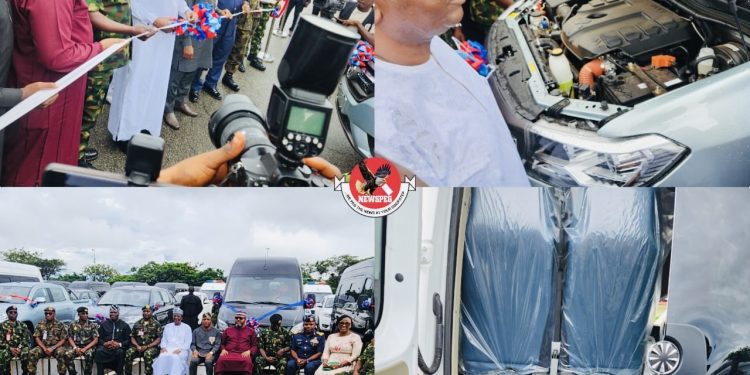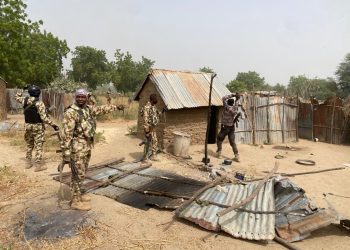By Nkechi Eze
As global temperatures rise and nations intensify efforts to combat climate change, the transition to cleaner and more sustainable energy sources has become not only an environmental imperative but also a strategic one. In Nigeria, where the removal of fuel subsidies and the deregulation of the petroleum sector have accelerated the need for affordable alternatives, the Federal Government has embraced Compressed Natural Gas (CNG) as a viable solution for transportation and logistics. At the heart of this shift lies the Presidential Initiative on Compressed Natural Gas (PI-CNG), a flagship policy aimed at reducing Nigeria’s carbon footprint while enhancing energy efficiency.
In a landmark move underscoring this national agenda, the Defence Headquarters (DHQ) has commissioned a fleet of CNG-powered vehicles into the logistics operations of the Armed Forces of Nigeria. The commissioning ceremony, held at the Mogadishu Cantonment in Asokoro, Abuja, marked a historic convergence of national security objectives and environmental responsibility. The event drew key stakeholders from the defence, energy, and transport sectors, and was widely hailed as a model of inter-agency collaboration in support of Nigeria’s clean energy transition.
Speaking at the ceremony, the Minister of State for Defence, Dr. Bello Mohammed Matawalle, MON, who served as the Special Guest of Honour, described the initiative as a strategic and forward-looking intervention. He noted that the commissioning aligns directly with President Bola Ahmed Tinubu’s Renewed Hope Agenda, which emphasizes innovation, resilience, and climate-conscious governance.
“This event is more than a symbolic unveiling of vehicles; it is a clear, strategic step towards energy sustainability, economic efficiency, and environmental resilience,” Dr. Matawalle said.
He emphasized that Nigeria, as a country rich in natural gas resources, must lead the continent in adopting clean fuel technologies, especially in critical sectors such as defence. The Minister stated that the shift to CNG in military logistics will drastically reduce greenhouse gas emissions, cut fuel expenditure, and promote operational innovation within government institutions.
“This is not a one-off event but the beginning of a long-term systemic change,” he added, calling for the establishment of CNG refueling infrastructure in all military formations and technical training for personnel. He reiterated the Ministry’s full commitment to policies that reinforce national security while supporting sustainable development.
Also speaking at the ceremony, the Chief of Defence Staff (CDS), General Christopher Gwabin Musa, described the commissioning as a key milestone in the transformation of the Nigerian Armed Forces. He said the introduction of CNG vehicles reflects the military’s commitment to modernizing its operations in alignment with national sustainability goals.
“This commissioning of CNG vehicles is a bold demonstration of our readiness to support national energy goals, improve cost-effectiveness, and contribute meaningfully to national development,” General Musa said.
He cited the recent commissioning of 800 Amphibious Special Forces in Jaji, Kaduna State, as another example of how the Armed Forces are embracing innovation and long-term planning in both security and sustainability. He expressed gratitude to President Tinubu for his leadership and to the Ministers of Defence for their continued support. The CDS also commended the PCNGI team for their dedication and technical expertise.
Programme Director of the Presidential CNG Initiative, Engr. Michael Oluwadamilola, applauded the Armed Forces for becoming the first government institution to fully adopt the CNG rollout under the federal initiative. He revealed that the Nigerian Army participated in the pilot phase and that over 5,000 vehicles are slated for conversion during the current implementation phase.
“This initiative represents more than clean energy adoption; it is a statement of national leadership,” he stated.
Providing operational context, the Chief of Defence Logistics, Major General J.T. Ochibano, disclosed that DHQ has been working closely with the PI-CNG to ensure a successful rollout. He revealed that the Armed Forces Mechanical Engineering facility has been equipped to train personnel from the Armed Forces and other security agencies in the operation and conversion of CNG vehicles. As part of the broader support framework, conversion kits are being supplied by the initiative.
General Ochibano noted that between November 2023 and June 2025, the Armed Forces received 20 CNG buses, 10 of which have been converted into ambulances; 50 Jet Lander CNG pickup vehicles; and 14 Jet Mover executive buses. All units were on parade during the ceremony.
He described the commissioning as a “bold and commendable step” that reflects the Armed Forces’ alignment with the Federal Government’s economic and environmental reforms.
Among those in attendance were Ambassador Gabriel Tanimu Aduda, Permanent Secretary, Ministry of Defence; Dr. Ismail Ahmed, Chairman of the Presidential CNG Initiative; senior military officers; representatives of the service chiefs; and various stakeholders from the energy and transportation sectors.
The commissioning is expected to significantly reduce the military’s carbon footprint, lower fuel costs, and position the Armed Forces of Nigeria as a model for sustainability in public service. More importantly, it signals the beginning of a transformative journey, one that balances national defence imperatives with responsible environmental stewardship in pursuit of a safer, greener, and more resilient Nigeria.















